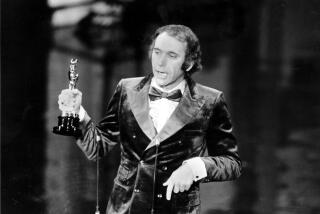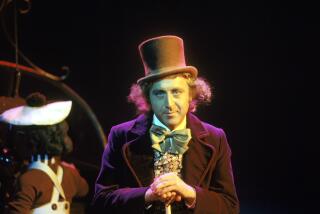‘Double Indemnity’ Reflects Billy Wilder at His Gritty Best
- Share via
“Double Indemnity” begins with a confession. Fred MacMurray, playing insurance agent-turned-murderer Walter Neff, puts a low fire under the pot with this:
“Yes, I killed him. For money. For a woman. I didn’t get the money and I didn’t get the woman. Pretty, isn’t it?”
From there, we’re off, watching Neff crawl to self-destruction. The movie is smoky, dank and nasty . . . it’s also a masterpiece of sorts, killer-cold film noir.
“Double Indemnity” (screening tonight with “The Third Man” as part of Cal State Fullerton’s fall film series) shows how good Billy Wilder could be at being bad. Wilder was a director who didn’t have any illusions when it came to people; he was as cynical as Capra was hopeful.
In at least a few of his pictures, Wilder showed that ordinary folks, if given half a chance, would do the rotten thing, especially when money or sex was the prize.
After that first confession, Neff tells his story in flashbacks, a gambit that seems old-hat today but was considered unusual in 1944, when “Double Indemnity” came out. Wilder used the technique more than once--William Holden’s bitter screenwriter gabs from the grave about all he’s been through in “Sunset Boulevard”--and it works like a constricting rope in “Double Indemnity.”
There’s resignation in Neff’s soliloquy, a fatalist’s awareness that murder doesn’t pay, no matter how much dough is out there, and no matter how good-looking the dame is.
The dame this time is Barbara Stanwyck, never a classic beauty and looking especially odd with her hair done up in Jean Harlow-platinum. But never mind that; there’s something going on behind those eager, suspicious eyes, and Neff wants to get close to it.
After accidentally meeting Phyllis Dietrichson (Stanwyck) at her husband’s swank house, Neff is hooked. A little later, he’s planning the man’s murder, with a $100,000 insurance payoff and Phyllis as the trophies. There’s a big problem, though. His boss, insurance investigator Barton Keyes (an almost perfect performance by Edward G. Robinson), starts unraveling everything.
The role of Neff may be MacMurray’s best, though he had to be persuaded to take it on. Known as a genial actor suited for flabbergasted leading man characters (like the one in “The Egg and I”), MacMurray felt Neff might ruin his career. It ended up doing just the opposite. His delivery is clipped, almost comically hard-boiled, but Neff comes across like gangbusters--we know exactly what he’s all about.
Stanwyck (a personal favorite, especially in her screwball comedies) is apparently miscast, but it’s a miscasting that’s pure serendipity. The snappy woman from films like “The Lady Eve” and “Meet John Doe” is serpentine and overheated in “Double Indemnity.” Like MacMurray, she also seems like something of a parody, but it’s an effective expression of immorality nonetheless.
Then there’s the concrete-hard screenplay, which carries its own Hollywood history.
Wilder wanted James M. Cain to write it with him (the movie is based on one of Cain’s novellas) but he was unavailable, already on contract with Fox. Wilder desperately turned to Raymond Chandler, believing his style was similar to Cain’s.
Wilder and Chandler disliked each other immediately. Chandler, a better writer than Cain, hated the comparison, and Wilder was impatient with Chandler’s constant boozing. They feuded through several long weeks.
Still, Wilder and Chandler found a truce just long enough to put together a script that’s gone down as one of the finest in the genre.
More to Read
Only good movies
Get the Indie Focus newsletter, Mark Olsen's weekly guide to the world of cinema.
You may occasionally receive promotional content from the Los Angeles Times.










